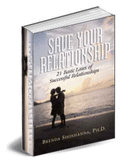 by Dr. Brenda Shoshanna
by Dr. Brenda Shoshanna[Self-Improvement:Attraction]
Article:
Rejection is one of the most painful experiences in relationships. Not only rejection from our partner, but also rejection from ourselves. As soon as some feel their partner is finding fault with them, they quickly begin to reject themselves. Their sense of self-worth and lovability is directly linked to how their partner feels about them. When an individual is in an abusive relationship, where rejection and fault finding is on-going, it is not unusual for them to completely lose confidence in themselves and their ability to ever love again.
But let’s look at this more closely. What is really happening when a person is feeling rejected? Is it really due to the behavior of their partner, or is it that they are now down on themselves? When a person feels really secure and good about themselves, it doesn’t matter how anyone else treats them or what they do or say. Here is a basic law of love. When you thoroughly absorb this and practice it in your relationships, your sense of self worth and equilibrium automatically grows.
How A Person Treats You Says More About Them Then About You
Negative behavior from your partner reflects on them, not you. It is their difficulty they are expressing. Never take it personally. When you take it personally, it simply means that now you are agreeing with their negativity and rejecting yourself.
The Dynamics Of Rejection If we look more closely we can discover that rejection is a common occurrence. Many of us are involved in it on an on-going basis. From morning to night, we complain, judge, condemn and basically reject most of what life brings to us. We want one thing and get another. We enjoy warm weather and it always rains. We want our partner to behave in one way and they do the opposite. We can even start to feel there’s something wrong with everyone we meet, that we have to fix, change or instruct them. This keeps us feeling separate and alone. What we do not see is that we ourselves have set into motion this experience of rejection.
Guideline: Stopping Rejection
If you are being rejected a lot, take time to notice the ways in which you reject yourself or others. Then stop it. Turn it around. Look for what is good or right about the person or situation in front of you. Look for what is good and right about yourself.
Do Not Look For The Faults Of Others
Loneliness and upset in our relationships comes from projecting our faults onto others, and then rejecting them. It also comes from others doing the same to us. When we do this, we then spend most of our time trying to change and control others or ourselves. This never, ever makes for happy relationships where both parties can be themselves, feel wanted and naturally grow.
When we catch ourselves being rejected or rejecting others, we can stop this process by taking responsibility for what is happening. We can immediately look for our part in how we are perceiving others - and ourselves.
Here are 2 more laws of love:
1) The more we value, like and appreciate ourselves, the less we will be affected by rejection.
2) The more we value, like and appreciate others, the less they will reject us.
The experience of acceptance and oneness is what everyone desires. Give that to others and give it to yourself. In order to do this we must realize that whoever appears before us, is simply another face of ourselves. Judgment or the desire to change them is not necessary. Curiosity is a better response.
As we allow others to be who they are, and view them with understanding the mind that accepts develops in us. This mind is your greatest asset.. The mind that accepts provides a positive outlook that nurtures and upholds all life.
This may take a little time and practice, but it is well worth it. As we practice this kind of open-heartedness it will soon become obvious that the way we treat others is also the way we treat ourselves. The more we accept others, the happier, healthier and more fulfilled our lives and relationships will be.
 SAVE YOUR RELATIONSHIP (www.truthaboutlove.com) is a ground-breaking relationship counseling program. It unlocks to the proven methods to overcoming the most difficult relationship problems.
SAVE YOUR RELATIONSHIP (www.truthaboutlove.com) is a ground-breaking relationship counseling program. It unlocks to the proven methods to overcoming the most difficult relationship problems.
Written by Dr. Shoshanna, a state licensed Psychologist & Psychoanalyst. She is an award winning international author, a resident relationship expert on i.village.com -and a professor at Barnes and Noble University Online. She appears regulary on network TV, sharing relationship advice, guidance and healing with audiences worldwide.
Blog Home Page
Learn more about Dr. Shoshanna's services, programs, publications and free offers at http://www.brendashoshanna.com. Contact her at topspeaker@yahoo.com


